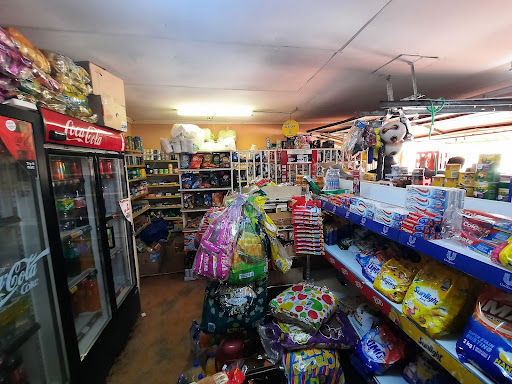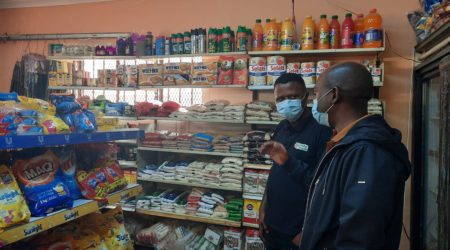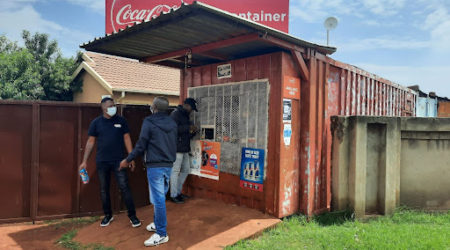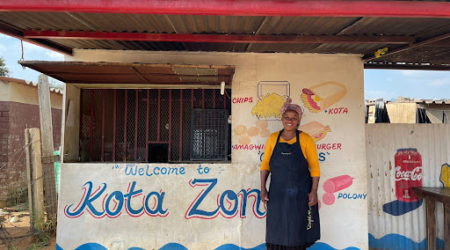Digital innovations to build the resilience of South African spazas: The case of A2Pay

The Organisation for Economic Co-operation and Development (OECD) estimates that 54% of the 2.6 million micro, small and medium enterprises (SMEs) in South Africa are micro-enterprises, while 37% are formal. For these businesses to grow, create employment, and generate economic growth, they need access to capital. Business support can help fill this gap.
In this post, we explore how fintech companies can power the growth of spazas by providing working and growth capital, stock management solutions and business support. Additionally, we highlight the role the Digital Spazas Program has played in bolstering the support A2Pay offers to spazas to provide wider benefits.
Mpho is in his early twenties; he owns a walk-in spaza in Soweto that makes ZAR 500,000 in revenue per month. He has built a thriving business that has grown 10-fold in the last four years. His spaza employs four people. Mpho attributes the growth of his business to the support and credit offered by A2Pay. A2Pay, a fintech company, offers a combination of hardware and digital tools tailored to spaza shop needs, as well as digital credit, business training, and coaching solutions to small businesses. Previously, Mpho had operated an internet cafe for 8 years before he got the opportunity to open up a spaza shop at the current premises in 2019. He learned about A2Pay through their onboarding agents at the onset of the Covid-19 pandemic.
At the time, A2Pay supported the registration of numerous small businesses to enable them to get the right permits to operate during the lockdown. It also served as a channel for disbursing business relief grants. Mpho remembers business being slow, but there was an increase in demand for airtime and data bundles as more people stayed home. He needed to stock more virtual goods but did not have the capital. While undertaking training modules with A2Pay, Mpho became aware of their offering to facilitate credit to members of their program. His greatest fear of borrowing was not being able to repay should his business fail. Despite his belief that paying in cash was the best way, he overcame his doubts once the A2Pay team took him through their offering. He appreciated that repayments would be deducted daily, in a pay-as-you-earn fashion, instead of one lump per month. Moreover, A2Pay computed an amount that his daily airtime sales could cover.
Mpho borrowed ZAR 15,000 for the stock and has since borrowed two other loans totaling ZAR 170,000 to buy a business van and acquire a bakery in his building. He has ambitions to keep growing and is currently in talks with his landlord to buy the apartment he rents. He is saving towards his goal but also hopes to borrow when he is ready, which will likely be very soon. Even during the current economic downturn and worsening electricity supply/ load shedding, Mpho’s business is better equipped than most to weather the shocks, thanks to A2Pay. He was able to buy two generators through the A2Pay buck rewards loyalty rewards program.
How does A2Pay achieve such results?
It is through grit, technology, and partnerships that A2Pay has managed to achieve such results at scale. Founded in 2009, A2Pay is a fintech that realized the opportunity of digitizing small township businesses early. They initially started with off-the-shelf technology but quickly realized it did not marry the on-the-ground realities. For instance, to achieve cost-effective technology that operates in unreliable electricity conditions and is adaptable as businesses grow, they have had to build for and continue to iterate over time.
A2Pay deploys point of sale (POS) systems coupled with user training and business coaching to small, medium and micro retailers in South Africa’s townships. A2Pay’s goal is to help them to grow and employ more people by encouraging sound business practices. Tina Mason, the Chief Operating Officer of A2pay, explains the hypothesis: “The merchants see the business performance [through the reports generated by the POS systems]. Once they understand it, they will want it to grow.” Mpho and other A2Pay spazas that we interviewed confirmed the hypothesis to be true:
Training is needed to be able to see and understand the useful reports. Before A2Pay, I used to operate old school – I could take cash whenever I wanted without thinking about how much cash I needed for stock.”
“I can see how my money is moving, and as a result, I now make a lot more money.”
Moreover, it is through the same POS system reports that A2Pay can track the growth of spazas, provide the handholding required, and base lending. A2Pay has about 4,000 spazas using its POS systems. This has been made possible through subsidies from Jobs Fund and SASME. The financial support has enabled the deployment of the devices at minimal cost to the spazas. In exchange, the spazas are expected to dedicate time to diligently take part in the prescribed training and capture stock movements through the POS system. The digital onboarding training, business coaching, and credit-wellness training conducted in-person or telephonically over a 3-month period would not be possible without the robust workforce of about 250 employees.
Just like Mpho, A2Pay has great ambition. They aim to reach 10,000 spazas by the end of 2022. The A2Pay team realizes that they must apply touch1The need to combine the rollout of these digital solutions with a human touch due to realities such as low literacy, low adoption of technology and language barriers, etc. However, they must also optimize the use of technology to scale further.
How has the Digital Spazas Program bolstered A2Pay’s offering?
Through the Digital spazas program, an initiative designed to improve the livelihoods and resilience of spaza shop owners in South Africa’s townships, launched by BFA Global in partnership with J.P. Morgan, BFA supported the design and deployment of A2Pay’s credit wellness 3-week program via Whatsapp. A2Pay believes access to capital must be combined with financial literacy, and this contributes to their low default rate of 3.5%. The pilot aimed to test the possibility of deploying the training modules efficiently and effectively using technology as opposed to in-person. BFA proposed WhatsApp as it is an accessible platform and can easily be used by most of the spaza owners we’d interviewed.
Ultimately, the three-month pilot was a resounding success. It doubled the number of loan applications received per week, and 36% of the loans were from customers that had never borrowed, meaning it was significantly effective for transferring new concepts to new users. A2Pay has since adopted the co-designed WhatsApp training methodology as the primary method for conducting credit wellness training to achieve a faster but more effective rollout of credit to deserving spazas. A2Pay is also expanding the methodology to other training modules.
JPMC and BFA Global launched Digital Spazas, a program focused on strengthening the financial health and resilience of ‘spazas,’ informal retailers in the South African townships, and helping them digitize to be more resilient in the face of future crises. The program set out to demonstrate that digitally-enabled MSEs are better equipped to survive and bounce back from unexpected shocks, better suited to grow through higher sales and operational efficiencies, and can ultimately access an expanding suite of financial services.
The Digital Spazas program partnered with three South African innovators – A2Pay, Vuleka, and Yebo Fresh – with boots on the ground and products already serving spazas in the township economy. For two years, BFA Global worked with these innovators to design and deploy new digital and digitally-enabled solutions that help spazas access credit to restock their shops and continue to sell through the pandemic, access credit for store expansion or asset purchase, increase their income opportunities, and improve their ability to invest in the long-term needs of their business.



